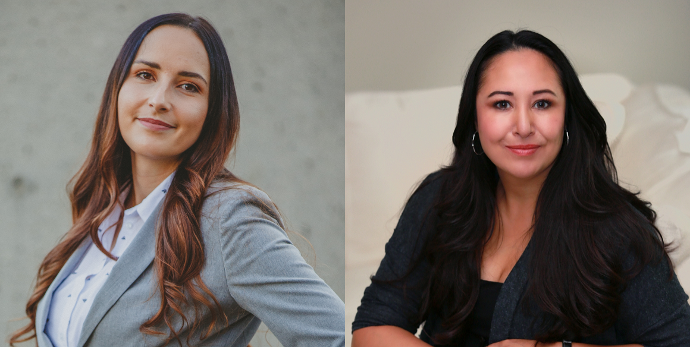Two law students appointed to national Indigenous associations
Sarah Kent - 3 November 2020

Two students at the University of Alberta Faculty of Law have been elected to represent Indigenous law students across Canada at the Indigenous Bar Association and the National Indigenous Law Students’ Association.
Nêhiyaw (Cree) law student Anita Cardinal-Stewart, ‘22 JD, will serve as the vice-president First Nations for the National Indigenous Law Students’ Association (NILSA) and as student representative for the Indigenous Bar Association (IBA). Métis law student Kienna Shkopich-Hunter, ‘22 JD, will act as communications officer for NILSA.
“I’m really happy that the U of A is so well represented this year,” says Shkopich-Hunter.
NILSA’s mandate is to advocate for and foster ongoing relationships between Indigenous law students at the national level while the IBA is invested in defending and promoting the interests of Indigenous Peoples in the legal profession.
Anita Cardinal-Stewart
As a member of Woodland Cree First Nations, Cardinal-Stewart will advocate for First Nations students across Canada, alongside representatives from Inuit and Métis communities, in her position with NILSA.
“(As Indigenous Peoples), kinship and family tells us who we are, where we come from and provides a source of advocacy. Many voices are needed for each section of the family as we support initiatives for Indigenous rights across Canada. We are all family,” she said, noting that representation for each Indigenous community matters to NILSA.
Advocacy comes naturally to Cardinal-Stewart, who also serves as the president of UAlberta’s Indigenous Law Students’ Association and as an Edmonton Program Leader for Level Justice Indigenous Youth Outreach Program.
As the IBA student representative, Cardinal-Stewart will serve a two-year term and will act as a liaison between Indigenous students and the IBA executive board.
For Cardinal-Stewart, the representation and support that NILSA and the IBA provides for Indigenous students is critical.
“I never met an Indigenous lawyer until I was in my late twenties. We didn’t have those examples in my community, so I never thought it was possible (to be a lawyer) until later in life,” said Cardinal-Stewart. “It is wonderful to see the Indigenous law community continue to grow so that the next generation has a well of inspiration to choose from.”
Cardinal-Stewart looks forward to using her voice to support Indigenous law students and advocate for Indigenous rights in her new leadership positions.
Kienna Shkopich-Hunter
Creating an online community is more important now than ever when gatherings can not occur in person due to the pandemic, says Shkopich-Hunter, who plans to build NILSA’s social media presence during her term as communications officer.
“I wanted to be involved with community-building and activism,” she says. “I’m looking forward to how we can raise awareness about current events.”
She is currently profiling NILSA members on Instagram, a campaign that is intended to build an online community and create awareness of Indigenous law students’ diverse backgrounds and their unique paths to law.
Shkopich-Hunter believes NILSA’s social media has the potential to inspire the next generation of Indigenous law students.
“(I want to) show prospective students that there is a place for them at the law school. There is a community here for them,” she says.
While the Faculty of Law at the University of Alberta has a flourishing community of Indigenous law students, Shkopich-Hunter recognizes that some Indigenous students experience isolution at law schools where the Indigenous community is still growing. Shkopich-Hunter hopes that a strong social media presence will remind those students that they are not alone as they navigate their law school journeys.